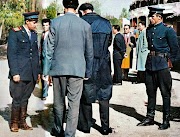Dawn beyond the Shadow: The Twilight of Enver Hoxha
Albanian Chronicles - Diary
April 11, 1985
There is, in the plot of every life, an episode that is engraved with indelible precision in the memory, marking the passage from one era to another, a moment so pregnant that it alters the very perception of time and space. Americans refer to this watershed as 'the end of the age of innocence', a concept often associated with the assassination of John F. Kennedy, an event so ingrained in the collective imagination that it remains etched in memory like an indelible seal. This concept is not unique to American culture; in fact, every generation carries within it the memory of a similar moment, a sharp break in the fabric of its personal and collective history.
For my generation, a parallel of such magnitude is embodied by the attack on the Twin Towers on 11 September 2001. We all remember precisely where we were and what we were doing at that precise moment. However, for us Albanians, an event with a comparable emotional and historical impact has a different date: 11 April 1985. I was only eight years old at the time, yet that day is etched in my memory with extraordinary clarity, marking one of the first clear and indelible memories of my childhood. I am talking about the death of Enver Hoxha, the dictator who had ruled Albania with an iron hand for decades.
The news of his passing was for me, as for many of my fellow countrymen, not only a historical event of national significance but also a personal turning point, a sort of collective rite of passage. In a way, it represented the end of our 'age of innocence', similar to what happened for Americans with the Kennedy assassination or for an entire generation with 9/11. It was a point of no return, after which nothing would be the same as before, a moment when personal and collective history merged into a single, indissoluble memory.
The day the 'supreme leader' left us marked an era of unprecedented confusion for the Albanians. The streets were filled with a silence laden with despair, a subtle hysteria permeating every corner of daily life. It was as if, suddenly, the very being of the Albanians had lost all meaning, leaving behind an unbridgeable void. The death of the dictator, a figure who had dominated the nation's existence with an iron fist, provoked reactions that went beyond simple mourning; it was almost a collective emotional breakdown, a sign of how deeply his regime had affected the soul of the Albanians.
For years, the Albanians had lived under the shadow of a dictatorship that had deprived every individual of any fundamental freedom, even the freedom to rise up in prayer. The invisible chains that had bound the population for so long seemed, paradoxically, to become even heavier the moment of its departure. The contradiction of feeling a sense of bewilderment at the death of the one who had been the architect of so much suffering reflected the complexity of the Albanians' bond with the past and the difficulty of imagining a different future.
The loss of the 'supreme leader' represented not only the end of an era of oppression for the Albanians, but also the beginning of a difficult journey of reconciliation with themselves and with history. Their path, from then on, would be marked by the challenge to regain the freedoms that had been denied them and to restore meaning to a life that, for too long, had been defined by others.
This turning point, though fraught with uncertainty, offered Albanians the chance to look beyond the veil of oppression, glimpsing the hope of a new beginning. The time had come for Albanians to question who they wanted to be in a world that suddenly seemed to offer the blank canvas on which to paint their future.
Six years later, the awakening of the Albanians from a long nightmare took shape in a symbolic and decisive act: on 20 February 1991, the statue of Enver Hoxha in Tirana was pulled down. This event did not only mark the physical end of a monument; it represented the definitive end of an era of dictatorship and oppression. With this gesture, Albania and the Albanians began their journey towards freedom and democracy, something they had aspired to achieve over the previous fifty long years.
The pulling down of the statue was the first step on a path that would lead the Albanian people towards new horizons of hope and renewal. At that moment, Albania opened a new chapter in its history, marking the beginning of an era in which freedom and democracy would no longer be mere aspirations, but concrete realities towards which they would advance with determination.
Time flows inexorably, marking the passing of the years with precision. Thirty-nine years have passed since that day I called 'the lost age of innocence'. Now, as I approach forty-seven, I am surprised by the clarity with which that moment remains etched in my memory. The certainty that I will never forget where I was on that fateful day underlines how certain events have the power to carve themselves deeply into our experience, delineating sharp contours in our personal history.












0 Comments